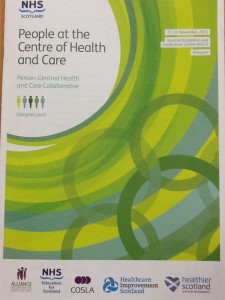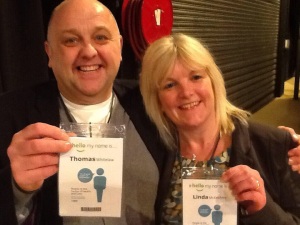POWER OF ATTORNEY - START THE CONVERSATION
twitter @starttalkingpoa
A new campaign is being launched across Glasgow City to raise awareness about the importance of having power of attorney granted to a trusted relative or friend.
NHS Greater Glasgow and Clyde and Glasgow City Council have joined forces with Alzheimer Scotland, Scottish Care and local law firms to highlight the need to ‘Start the Conversation’ with family members on putting a power of attorney in place.
The campaign aims to encourage people to talk to their loved ones about establishing a power of attorney so that if the person takes ill and is unable to make decisions someone can step in.
Having a power of attorney in place really can make a difference and can ensure that people’s wishes are carried out quickly without prolonged legal negotiations. If a loved one is in hospital and there is no power of attorney this can delay the patient’s discharge and have them remain in hospital longer than necessary.
The campaign includes three TV adverts to be shown at peak view time from Sunday (December 1st) featuring the actor/director Johnnie Beattie and his daughter Maureen, and acting/broadcasting brothers Sanjeev and Hardeep Kohli.
which provides valuable information and highlights the case of three families and their experiences in putting a Power of Attorney in place. Additionally, the campaign has utilised the power of social media to reach people with a Facebook page and a twitter feed.
Jill Carson, Adult Services Manager, North West Sector, Glasgow City Community Health Partnership, said: “A lot of people don’t know that if they become ill or injured and are unable to make decisions for themselves no-one else can do this for them unless legally they have been given power to do so.
“There is also a misconception that Powers of Attorney are for the wealthy or elderly but anyone over the age of 16 can grant a Power of Attorney as accidents or illness can happen at any time.
“A Power of Attorney is not just about looking after someone’s financial affairs. It also allows for welfare issues to be decided if someone is unable to make a decision about medical treatment or about where to live. This can be the biggest problem facing someone in hospital. For example, if no-one is appointed to act in the patient’s best interests, then a legal process is required before the patient can be discharged to an appropriate setting such as a care home.
Ann Cummings, Glasgow City Council Social Work Planning and Performance Manager added: “Social work services fully supports this campaign to promote advanced decision making through Power of Attorney with the citizens of Glasgow.
“Social Work is in a difficult position where someone lacks capacity and there is no Power of Attorney in place - in terms of the law we are unable to move someone without their consent and this can often mean that older people need to remain in hospital for long periods of time when they have no medical needs. Guardianship needs then to be pursued by families or the Council, this can be costly and lengthy.
“A few years back up to 60-70 older people in any one month were unable to leave hospital and at this time guardianship applications were taking up to 300 days. Last months figures show Adults With Incapacity delayed in hospital over four weeks is 33. While there has been progress, there remain high numbers of vulnerable older people who whilst being medically fit cannot leave hospital”
FREQUENTLY ASKED QUESTIONS
What is a Power of Attorney
A Power of Attorney is a written, legal document giving someone else (your Attorney), authority to take actions or make decisions on your behalf (the granter). You choose the person(s) you want to act as your Attorney and what powers you want the Attorney to have. A Power of Attorney is intended to ensure that your financial affairs and personal welfare can still be dealt with/protected in the event of you being unable to act on your own behalf.
Are Powers of Attorney not just for elderly people?
No - anyone over the age of 16 can grant a Power of Attorney. Accidents or illness can happen at any age. The sooner a Power of Attorney is completed, the better. The deed does not need to be registered straight away – it can be stored in your solicitor’s safe and only registered when your attorneys are required to commence acting.
Are Powers of Attorney not just for the wealthy?
No – a Power of Attorney is not just about looking after your financial affairs. It also allows you to choose who should decide personal welfare issues (e.g. where you live/who looks after you etc).
What sorts of powers can be included in the Power of Attorney deed?
The deed can cover both financial and welfare provisions or you can have separate deeds to cover your financial affairs and welfare matters.
The financial provisions can include power to purchase and sell heritable property (i.e. your house), power to operate bank accounts, power to claim and receive all pensions, benefits, allowances, etc. There are many other powers which can be included or left out as appropriate, depending on your circumstances.
Welfare powers can include power to decide where you should live, to have access to your personal information, to consent or withhold consent to medical treatment. There are many other powers which can be included to ensure that all appropriate powers are available to meet your needs.
Who should be appointed as an Attorney?
You can appoint anyone you wish to be your attorney, e.g. a family member, friend, solicitor
or other professional adviser. It is up to you whether you include the same person(s) as
both financial and welfare attorneys, or if you have separate attorneys to carry out the different function.
It is better to appoint more than one attorney in case your attorney is unable to act for any reason – you can appoint joint attorneys with similar or different powers, or one or more substitute attorneys to take the place of an attorney who dies, loses capacity or resigns.


.jpg)








.jpg)
.jpg)

.jpg)






